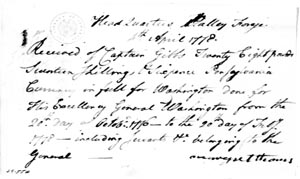Margaret Thomas: free black woman at Washington's headquarters
 Margaret Thomas was a free black woman who joined the staff of Gen. George Washington's headquarters in February 1776, according to the accounts of his household manager Ebenezer Austin. At that time, Washington was living in the Cambridge mansion now known as Longfellow House, trying to push the British military out of Boston.
Margaret Thomas was a free black woman who joined the staff of Gen. George Washington's headquarters in February 1776, according to the accounts of his household manager Ebenezer Austin. At that time, Washington was living in the Cambridge mansion now known as Longfellow House, trying to push the British military out of Boston.
Thomas's duties included washing and mending clothes. She seems to have remained with the commander-in-chief's shifting headquarters throughout the first years of the war, judging by such documents as this 1778 receipt she signed at the bottom (courtesy of the Library of Congress's online collection of Washington papers). At the end of her service, she apparently went to live in Philadelphia, and the general never expected to see her again.
But in 1784, Washington's bodyservant and riding companion Will Lee came to him with a request, as he described in this 28 July letter to his Philadelphia agent, Clement Biddle:
The mulatto fellow William, who has been with me all the War is attached (married he says) to one of his own colour a free woman, who, during the War was also of my family.As I read this letter, Washington was skeptical that Will Lee and Margaret Thomas were truly married. He may have suspected they had come up with this plan to secure Thomas a more comfortable home while she was sick. The general worried about creating resentment among his enslaved workers at Mount Vernon by employing free blacks, and he had no individual liking for Thomas.
She has been in an infirm state of health for sometime, and I had conceived that the connection between them had ceased, but I am mistaken; they are both applying to me to get her here, and tho' I never wished to see her more yet I cannot refuse his request (if it can be complied with on reasonable terms) as he has lived with me so long and followed my fortunes through the War with fidility.
After promising thus much, I have to beg the favor of you to procure her a passage to Alexandria either by Sea, by the passage Boats (if any there be) from the head of Elk, or in the Stage as you shall think cheapest and best, and circumstances may require.
She is called Margaret Thomas als. Lee (the name which he has assumed) and lives at Isaac and Hannah Sills, black people who frequently employ themselves in Cooking for families in the City of Phila.
Yet Washington didn't feel he could refuse Lee's request. He agreed to do a big favor for his long-time slave. To borrow an analogy from former Mount Vernon staffer Bruce Harris (now head of the Literary Trail of Greater Boston), since Washington had been raised to consider slaves as property, this was rather like one of us agreeing to make space for another refrigerator because our current refrigerator asked.
There's no evidence that Margaret Thomas ever made it to Virginia, however. It's unclear whether Biddle found her in Philadelphia, if she was in shape to travel, or if she cared to.
Washington freed Will Lee in his will, leaving it to his widow Martha to complete the emancipation of the rest of their human property. Lee remained at Mount Vernon until 1828, working for wages as a shoemaker. There's a chapter about him in Fritz Hirschfeld's George Washington and Slavery: A Documentary Portrayal.

No comments:
Post a Comment